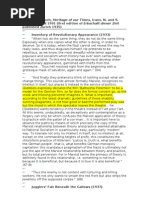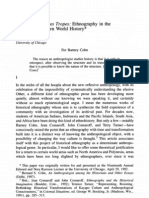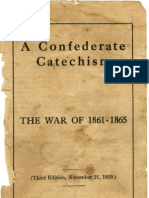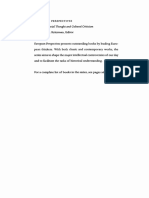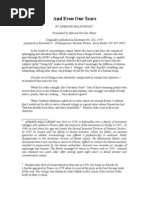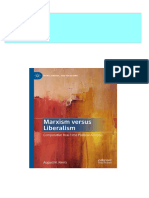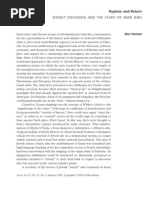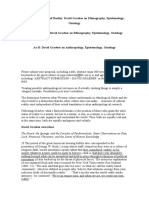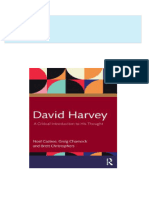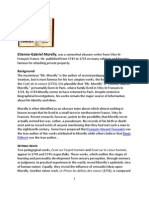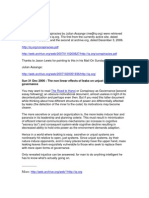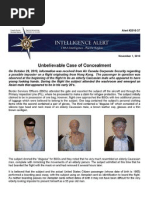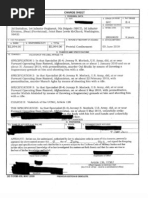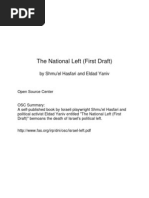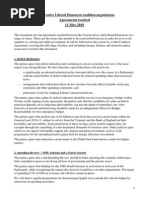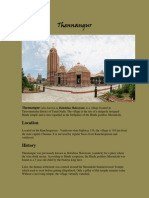"The Need To Forget," by Yehuda Elkana
"The Need To Forget," by Yehuda Elkana
Uploaded by
rpmackey3334Copyright:
Available Formats
"The Need To Forget," by Yehuda Elkana
"The Need To Forget," by Yehuda Elkana
Uploaded by
rpmackey3334Original Title
Copyright
Available Formats
Share this document
Did you find this document useful?
Is this content inappropriate?
Copyright:
Available Formats
"The Need To Forget," by Yehuda Elkana
"The Need To Forget," by Yehuda Elkana
Uploaded by
rpmackey3334Copyright:
Available Formats
Yehuda Elkana The Need to Forget I was carried off to Auschwitz as a boy of ten, and survived the Holocaust.
The red Army freed us, and I spent a number of months in a Russian Liberation Camp. Later I concluded that there was not much difference in the conduct of many of the people I encountered: Germans, Austrians, Croats, Ukrainians, Hungarians, Russians, and others. It was clear to me that what happened in Germany could happen anywhere, and to any people, also to my own. On the other hand, I concluded that it is possible to prevent such horrible events by means of appropriate education and in the right political setting. There is not now, and never has been any historical process that necessarily leads to genocide. For decades after my immigration to Israel, in 1948, I paid no conscious attention to whether there is a well-defined political and educational message to be derived from the Holocaust. Pre-occupied with my own future, I avoided theoretical generalizations about the uses of the past. It is not that I repressed or refused to speak about what had happened to me. I spoke often with my four children about the past and the lessons I had drawn form it. I shard emotions and thoughts with them - but only on the personal level. My reluctance to follow the Eichmann trial at all; my strong opposition to the Demjanjuk trial, my refusal to accompany my children on visits to Yad Vashem - these seemed to me mere personal preferences, perhaps somewhat idiosyncratic. Today, however, I see the matter in a different light. Talking with my friends during recent weeks, I have felt a strange advantage over those who were born here and did not experience the Holocaust. Whenever there is a report of some anomalous incident, their initial reaction is a refusal to believe that it happened; only after reality slaps them in the face do they yield to the facts. Many then lose all sens of proportion and are willing to accept the line that theyre all like that or the Israeli Army is like that; or they loathe both the perpetrators of such deeds and hate the Arabs who have brought us to that. Many believe that the majority of Israelis are consumed by a profound hatred of the Arabs, and are equally convinced that the Arabs feel a profound hatred for us. None of this happens to me. First of all, there is no anomalous incident that I have not seen with my own eyes. I mean this literally: I was an eye-witness to incident after incident; I saw a bulldozer bury people alive, I saw a rioting mob tear away the life-support system from old people in the hospital, I saw soldiers breaking the arms of a civilian population, including children. For me all this is not new. At the same time I do not generalize: I do not think that they all hate us; I do not think that all Jews hate the Arabs; I do not hate those responsible for the anomalies - but that does not mean that I condone their acts or that I do not expect them to be punished with the full severity of the law. On the other hand, I am searching for deeper roots of what is happening these days. I am not one of those who believe that half of this nation are brutes. Most definitely I am not one of those who see brutality as an ethnic phenomenon. First of all I see no link between unrestrained conduct and ideological extremism. Furthermore, ideological extremism is more a characteristic of the Jews from Russia, Poland, and Germany, much more than of those whose origins are in North Africa or Asia.
Some hold that lack of security, economic, and social-pressures have produced a frustrated generation, seeing no future for themselves, individually and existentially no hope of acquiring higher education and a profession, of supporting themselves respectably, of attaining suitable housing and a reasonable quality of life. It is difficult to estimate the veracity of this assumption, and especially to assess the number of people to whom this sort of frustration ostensibly applies. That personal frustration can lead to anomalus behaviour is well known. Lately I have become more and more convinced that the deepest political and social factor that motivates much of Israeli society in its relations with the Palestinians is not personal frustration, but rather a profound existential Angst fed by a particular interpretation of the lessons of the Holocaust and the readiness to believe that the whole world is against us, and that we are the eternal victim. In this ancient belief, shared by so many today, I see the tragic and paradoxical victory of Hitler. Two nations, metaphorically speaking, emerged from the ashes of Auschwitz: a minority who assert, this must never happen again, and a frightened and haunted majority who assert, this must never happen to us again. It is self-evident that, if these are the only possible lessons, I have always held to the former and seen the latter as catastrophic. Here I am not supporting one of these two positions, but rather wish to assert normatively that any philosophy of life nurtured solely or mostly by the Holocaust leads to disastrous consequences. Without ignoring the historic importance of collective memory, a climate in which an entire people determines its attitude to the present and shapes its future of that society, if it wants to live in relative tranquillity and relative security, like all other peoples. History and collective memory are an inseparable part of any culture but the past is not and must not be allowed to become the dominant element determining the future of society and the destiny of the people. The very existence of democracy is endangered when the memory of the dead participates actively in the democratic process. Fascist regimes understood this very well and acted on it. We understand it today, and it is no accident that many studies of Nazi Germany deal with the political mythology of the Third Reich. Relying on the lessons of the past in order to build the future, exploiting past suffering as a political argument - these mean involving the dead in the political life of the living. Thomas Jefferson once wrote that democracy and worship of the past are incompatible. Democracy fosters the present and the future. Too much of Zechor! (Remember) and addiction to the past undermine the foundations of democracy. Had the Holocaust not penetrated do deeply into the national consciousness, I doubt whether the conflict between Israelis and Palestinians would have led to so many anomalies, and even whether the political peace process would have been today in a blind alley. I see no greater threat to the future of the State of Israel than the fact that the holocaust has systematically and forcefully penetrated the consciousness of the Israeli public, even that large segment that did not experience the Holocaust, as well as the generation what was born and grew up here. For the first time I understand the seriousness of what we were doing when, decade after decade, we sent every Israeli child on repeated visits to Yad Vashem. What did we want those tender youths to do
with the experience? We declaimed, insensitively and harshly, and without explanation: Remember! Zechor! To what purpose? What is the child supposed to do with these memories? Many of the pictures of those horrors are apt to be interpreted as a call to hate. Zechor! can easily be understood as a call for continuing and blind hatred. It may be that it is important for the world at large to remember. I am not even sure about that, but in any case it is not our problem. Every nation, including the Germans, will decide their own way and on the basis of their own criteria, whether they want to remember or not. For our part, we must learn to forget! Today I see no more important political and educational task for the leaders of this nation than to take their stand on the side of life, to dedicate themselves to creating our future, and not to be preoccupied from morning to night, with symbols, ceremonies, and lessons of the Holocaust. They must uproot the domination of that historical remember! over our lives. What I have written her is harsh, and, unlike my custom, stated in black-and-white. This is no accident or a transient mood on my part. I have found no better way to indicate the seriousness of the problem. I know full well that no nation does or should totally forget its past, with all that is included therein. Of course there are some myths that are essential for building our future, like the myth of excellence or the myth of creativity; certainly it is not my intention that we cease teaching our history. What I am trying is to displace the Holocaust from being the central axis of our national experience. Appeared in Haaretz on the 2nd of March 1988
You might also like
- Renzo de Felice Interpretations of FascismDocument264 pagesRenzo de Felice Interpretations of FascismleonardobahamondesNo ratings yet
- John Makransky, Lama Surya Das, Philip Osgood - Awakening Through Love - Unveiling Your Deepest Goodness-Wisdom Publications (2007)Document271 pagesJohn Makransky, Lama Surya Das, Philip Osgood - Awakening Through Love - Unveiling Your Deepest Goodness-Wisdom Publications (2007)Kate TrusovaNo ratings yet
- African Ethics Gikuyu Traditional Morality (1) - Kopia - KopiaDocument278 pagesAfrican Ethics Gikuyu Traditional Morality (1) - Kopia - KopiaMartyneJohn100% (5)
- Letter From Birmingham Jail Full TextDocument6 pagesLetter From Birmingham Jail Full TextTim BerardiNo ratings yet
- Baker, On The Problem of The Ideological Origins of The French Revolution PDFDocument24 pagesBaker, On The Problem of The Ideological Origins of The French Revolution PDFLudo BeveridgeNo ratings yet
- The French Idea of Freedom: The Old Regime and the Declaration of Rights of 1789From EverandThe French Idea of Freedom: The Old Regime and the Declaration of Rights of 1789No ratings yet
- Bloch, Heritage of Our TimesDocument4 pagesBloch, Heritage of Our TimesThomas von WillNo ratings yet
- Europe and The People Without History PDF DownloadDocument2 pagesEurope and The People Without History PDF DownloadIrma0% (1)
- Escaping The Self-Determination TrapDocument12 pagesEscaping The Self-Determination TrapSabin DragomanNo ratings yet
- Crenshaw 1991Document60 pagesCrenshaw 1991theMadCookie100% (1)
- Crossing California by Adam Langer PDFDocument12 pagesCrossing California by Adam Langer PDFBayleeNo ratings yet
- Sahlins - Goodbye To Triste TropesDocument25 pagesSahlins - Goodbye To Triste TropeskerimNo ratings yet
- Friedman Neoliberalism and Its ProspectsDocument4 pagesFriedman Neoliberalism and Its Prospectschase125987100% (2)
- Lowith On His Last Meeting With HeideggerDocument3 pagesLowith On His Last Meeting With Heideggerwholybreaker100% (1)
- Excerpt From "Latino America" by Matt Marreto and Gary Segura.Document10 pagesExcerpt From "Latino America" by Matt Marreto and Gary Segura.OnPointRadioNo ratings yet
- "Underdevelopment in Cambodia," by Khieu SamphanDocument28 pages"Underdevelopment in Cambodia," by Khieu Samphanrpmackey3334100% (5)
- Confederate CatechismDocument12 pagesConfederate Catechismrpmackey3334No ratings yet
- Boyd IndictmentDocument14 pagesBoyd Indictmentrpmackey3334100% (3)
- Saraswati Stotram of Sage AgastyaDocument10 pagesSaraswati Stotram of Sage AgastyaSuneel KotteNo ratings yet
- Stone of DestinyDocument6 pagesStone of DestinyRalph Ellis100% (1)
- (The Henry L. Stimson Lectures Series) John Dunn-Breaking Democracy's Spell-Yale University Press (2014)Document207 pages(The Henry L. Stimson Lectures Series) John Dunn-Breaking Democracy's Spell-Yale University Press (2014)Ramon CardozoNo ratings yet
- Military Uses of Social Scientists in POW Camps During World War I & World War IIDocument15 pagesMilitary Uses of Social Scientists in POW Camps During World War I & World War IIsharkles777100% (1)
- Flusser "On The Deaths of Politics"Document3 pagesFlusser "On The Deaths of Politics"Daniela Ruiz Moreno100% (2)
- Carlo Ginzburg Wooden Eyes Nine Reflections On Distance PDFDocument294 pagesCarlo Ginzburg Wooden Eyes Nine Reflections On Distance PDFDiego ShienNo ratings yet
- Schwarz, Roberto - Misplaced IdeasDocument19 pagesSchwarz, Roberto - Misplaced IdeasRealperzaNo ratings yet
- Karl Loewenstein - Militant Democracy and Fundamental RightsDocument37 pagesKarl Loewenstein - Militant Democracy and Fundamental RightsDaniel Maia Teixeira100% (1)
- Etienne Balibar Race Nation Class PDFDocument1 pageEtienne Balibar Race Nation Class PDFBrandonNo ratings yet
- OneYear Followup Report-Transparency of Relief Organizations Responding To 2010 Haiti EarthquakeDocument125 pagesOneYear Followup Report-Transparency of Relief Organizations Responding To 2010 Haiti Earthquakedisasterwatchdog100% (2)
- What Happens To Antiracism When We Are Post-Race?Document9 pagesWhat Happens To Antiracism When We Are Post-Race?Alana LentinNo ratings yet
- Sample Chapter: Kairos - A Political Post-History of The Concept of TimeDocument41 pagesSample Chapter: Kairos - A Political Post-History of The Concept of TimeRowan G Tepper100% (1)
- Primera Sesión 3Document8 pagesPrimera Sesión 3Dona CastañedaNo ratings yet
- And Even Our Tears - About Yuri Dombrovsky by Armand MaloumianDocument17 pagesAnd Even Our Tears - About Yuri Dombrovsky by Armand MaloumianSolzy100% (3)
- Poland's Place in Eurasia: Eurasianism As An Analytical Framework and The Polish QuestionDocument77 pagesPoland's Place in Eurasia: Eurasianism As An Analytical Framework and The Polish QuestionJafe ArnoldNo ratings yet
- Dr. AbuKhalil Debates Israeli FascistDocument7 pagesDr. AbuKhalil Debates Israeli FascistJack StephensNo ratings yet
- An Illusion With A Future - John GrayDocument9 pagesAn Illusion With A Future - John GraybossanovasNo ratings yet
- rs21 Launch StatementDocument3 pagesrs21 Launch Statementrevolutionary socialism in the 21st centuryNo ratings yet
- Baumgarten, Albert - Marcel Simon's Verus Israel' As A Contribution To Jewish History (1999) PDFDocument14 pagesBaumgarten, Albert - Marcel Simon's Verus Israel' As A Contribution To Jewish History (1999) PDFPere GarciaNo ratings yet
- Society in the First World War: The Pre-War Mind in Britain. Society at War 1914-1916. Britain Holds On 1917, 1918. The Neuroses of the Nations.From EverandSociety in the First World War: The Pre-War Mind in Britain. Society at War 1914-1916. Britain Holds On 1917, 1918. The Neuroses of the Nations.No ratings yet
- Full Marxism Versus Liberalism: Comparative Real-Time Political Analysis August H. Nimtz PDF All ChaptersDocument52 pagesFull Marxism Versus Liberalism: Comparative Real-Time Political Analysis August H. Nimtz PDF All Chaptersniuvisvarhol57100% (3)
- War in the Age of Trump: The Defeat of ISIS, the Fall of the Kurds, the Conflict with IranFrom EverandWar in the Age of Trump: The Defeat of ISIS, the Fall of the Kurds, the Conflict with IranNo ratings yet
- WWW Historytoday Com Stefan Collini What Intellectual HistoryDocument20 pagesWWW Historytoday Com Stefan Collini What Intellectual HistoryAnonymous X40FqoDiCNo ratings yet
- Rupture and Return Ella ShohatDocument26 pagesRupture and Return Ella Shohateinat100% (1)
- "Why Do They Hate Us So?" A Western Scholar's Reply: Puppet MastersDocument6 pages"Why Do They Hate Us So?" A Western Scholar's Reply: Puppet Mastersfrank_2943No ratings yet
- Balibar - The Nation FormDocument34 pagesBalibar - The Nation FormMario RuferNo ratings yet
- HUIZINGA - MypathtohistoryDocument18 pagesHUIZINGA - MypathtohistoryRenato Ferreira LopezNo ratings yet
- David Graeber - As-IfDocument11 pagesDavid Graeber - As-IfAnonymous eAKJKKNo ratings yet
- David J. Wertheim-Salvation Through Spinoza (Jewish and Christian Perspectives) - Brill (2011)Document244 pagesDavid J. Wertheim-Salvation Through Spinoza (Jewish and Christian Perspectives) - Brill (2011)Muzza Doble50% (2)
- Chūshichi Tsuzuki The Life of Eleanor Marx 1855 1898. A Socialist Tragedy Oxford Clarendon Press 1967 OCRedDocument384 pagesChūshichi Tsuzuki The Life of Eleanor Marx 1855 1898. A Socialist Tragedy Oxford Clarendon Press 1967 OCRedRoberto HerreraNo ratings yet
- Strathausen - Myth or KnowledgeDocument23 pagesStrathausen - Myth or KnowledgeNicolás AldunateNo ratings yet
- Karl Löwith - Political Implications of Heidegger's ExistentialismDocument18 pagesKarl Löwith - Political Implications of Heidegger's ExistentialismGiordano BrunoNo ratings yet
- Scipes - The AFL-CIO's Foreign Policy Program - Where Historians Now StandDocument27 pagesScipes - The AFL-CIO's Foreign Policy Program - Where Historians Now Standrsgold100% (1)
- A Cold War Casualty in Jerusalem, 1948: The Assassination of Witold HulanickiDocument22 pagesA Cold War Casualty in Jerusalem, 1948: The Assassination of Witold HulanickiDror KleinNo ratings yet
- Natural Law and Human DignityDocument401 pagesNatural Law and Human Dignityreza ahmadivand100% (1)
- Buy ebook David Harvey A Critical Introduction to His Thought 1st Edition Noel Castree cheap priceDocument71 pagesBuy ebook David Harvey A Critical Introduction to His Thought 1st Edition Noel Castree cheap pricetofajhorn100% (2)
- The Eichmann Polemics: Hannah Arendt and Her Critics: Michael EzraDocument25 pagesThe Eichmann Polemics: Hannah Arendt and Her Critics: Michael EzraElis SimsonNo ratings yet
- The Coming Out of Jewish History in Greece: MemoryDocument10 pagesThe Coming Out of Jewish History in Greece: MemoryEleftheria AkrivopoulouNo ratings yet
- Balibar Nation FormDocument12 pagesBalibar Nation FormAndrew ChanNo ratings yet
- John Holloway - Crisis and CritiqueDocument6 pagesJohn Holloway - Crisis and CritiqueKeith EmersonNo ratings yet
- Godwin Enquiry Concerning Political Justice PDFDocument4 pagesGodwin Enquiry Concerning Political Justice PDFRobertNo ratings yet
- Platos View of TyrannyDocument269 pagesPlatos View of TyrannyDiego Pérez HernándezNo ratings yet
- MorellyDocument4 pagesMorellyHuma SheraziNo ratings yet
- Zeev Sternhell The Idealist Revision of Marxism The Ethical Socialism of Henri de Man 1979Document23 pagesZeev Sternhell The Idealist Revision of Marxism The Ethical Socialism of Henri de Man 1979Anonymous Pu2x9KVNo ratings yet
- A Critique of Roman RosdolskyDocument6 pagesA Critique of Roman RosdolskyIraldoMatiasNo ratings yet
- Hurricane Recovery Map Oct 312012Document1 pageHurricane Recovery Map Oct 312012anthony_rosa_16No ratings yet
- Hurricane Recovery Map Oct 312012Document1 pageHurricane Recovery Map Oct 312012anthony_rosa_16No ratings yet
- Fars News Agency Copy of Onion ReportDocument1 pageFars News Agency Copy of Onion Reportrpmackey3334No ratings yet
- Hurricane Recovery Map Oct 312012Document1 pageHurricane Recovery Map Oct 312012anthony_rosa_16No ratings yet
- Press Release - Armstrong Reasoned Decision 10 10 12Document2 pagesPress Release - Armstrong Reasoned Decision 10 10 12RaceRadioNo ratings yet
- State and Terrorist ConspiraciesDocument12 pagesState and Terrorist Conspiraciesrpmackey3334No ratings yet
- Mahmoud Ahmadinejad's Prepared RemarksDocument11 pagesMahmoud Ahmadinejad's Prepared Remarksrpmackey3334No ratings yet
- Disguise ArtistDocument1 pageDisguise Artistcbowler5070No ratings yet
- Pentagon Charge SheetsDocument5 pagesPentagon Charge Sheetsrpmackey3334No ratings yet
- Spending Review 2010Document106 pagesSpending Review 2010Martin ForsytheNo ratings yet
- The Coalition:: Our Programme For GovernmentDocument36 pagesThe Coalition:: Our Programme For GovernmentBren-RNo ratings yet
- The National LeftDocument48 pagesThe National Leftrpmackey3334No ratings yet
- Special Immigration Appeals Commission Judgment Regarding Abid Naseer and Ahmed Faraz KhanDocument22 pagesSpecial Immigration Appeals Commission Judgment Regarding Abid Naseer and Ahmed Faraz Khanrpmackey3334No ratings yet
- British Coalition Government AgreementDocument7 pagesBritish Coalition Government Agreementrpmackey3334No ratings yet
- Vatican IrelandDocument2 pagesVatican Irelandrpmackey3334No ratings yet
- Dystopian Lit 2Document49 pagesDystopian Lit 2api-336819783No ratings yet
- Shakespeare's Context For WitchcraftDocument7 pagesShakespeare's Context For WitchcrafthornaticNo ratings yet
- The Twelve Qualities of Faithful SlavesDocument14 pagesThe Twelve Qualities of Faithful Slavesk224900 Aliyan AliNo ratings yet
- Then Nang UrDocument4 pagesThen Nang UrAnnette MeyerNo ratings yet
- A Hindu Primer: YAKSHA PRASHNADocument3 pagesA Hindu Primer: YAKSHA PRASHNAsheenupp100% (2)
- Mapeh 2Document11 pagesMapeh 2Patrick Benedict RobieneNo ratings yet
- Journalofbiharre 05 BihauoftDocument746 pagesJournalofbiharre 05 BihauoftHung Pei YingNo ratings yet
- Test Questionnaire in English 8 2nd QuarterDocument4 pagesTest Questionnaire in English 8 2nd QuarterELVIE R. SALADAGA100% (1)
- Ooty Trip Quotes and Captions For Travel InstagramDocument2 pagesOoty Trip Quotes and Captions For Travel Instagramarpit kumarNo ratings yet
- Mural/Wall Painting: 1.ajanta Cave PaintingsDocument6 pagesMural/Wall Painting: 1.ajanta Cave Paintingssravan kumarNo ratings yet
- Multiculturalism at Risk: The Indian Minority in MalaysiaDocument2 pagesMulticulturalism at Risk: The Indian Minority in MalaysiasatyabashaNo ratings yet
- Bacaan Dan Doa Bilal Shalat TarawihDocument4 pagesBacaan Dan Doa Bilal Shalat TarawihNurhanifah Eka PutriNo ratings yet
- Czeslaw Milosz - Child of EuropeDocument4 pagesCzeslaw Milosz - Child of EuropeМилан Вукадиновић100% (1)
- The Arch of Titus: From Jerusalem To Rome-And Back Explores TheDocument1 pageThe Arch of Titus: From Jerusalem To Rome-And Back Explores Theρεζίν ντέιNo ratings yet
- Comunismo Na GuatemalaDocument20 pagesComunismo Na GuatemalaFábio LopesNo ratings yet
- (E.a The Grimoire of Amaymon (Nine Demonic Gatekeepers Book 2Document27 pages(E.a The Grimoire of Amaymon (Nine Demonic Gatekeepers Book 2Ṩĸṳlḷ Kȉď67% (6)
- FM InternalDocument5 pagesFM InternalLavisha TanejaNo ratings yet
- Liber CXX PDFDocument13 pagesLiber CXX PDFAn ZhuNo ratings yet
- Revisiting Social Acceptance of HomosexualityDocument18 pagesRevisiting Social Acceptance of HomosexualityAlthea EsperanzaNo ratings yet
- YHWH's Call For Israel's Return'. Command, Invitation, or ThreatDocument16 pagesYHWH's Call For Israel's Return'. Command, Invitation, or ThreatCentinela de la feNo ratings yet
- PhaedraDocument8 pagesPhaedraaintenoughNo ratings yet
- Relative Impermeability of The Wall of Separation: Marriage Equality in The PhilippinesDocument32 pagesRelative Impermeability of The Wall of Separation: Marriage Equality in The PhilippinesRobby DelgadoNo ratings yet
- Mock Exam QuestionsDocument7 pagesMock Exam QuestionsЭмиль БабашовNo ratings yet
- John LockeDocument21 pagesJohn LockeSamuelle Arden Papasin LacapNo ratings yet






